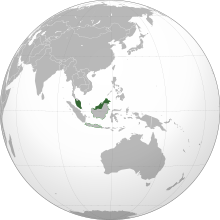
Back معاملة المثليين في ماليزيا Arabic মালয়েশিয়ায় সমকামীদের অধিকার Bengali/Bangla Drets del col·lectiu LGBT a Malàisia Catalan LGBT práva v Malajsii Czech Homosexualität in Malaysia German Diversidad sexual en Malasia Spanish Droits LGBT en Malaisie French זכויות להט"ב במלזיה HE Hak LGBT di Malaysia ID Diritti LGBT in Malaysia Italian
LGBTQ rights in Malaysia | |
|---|---|
 | |
| Status | Illegal since 1871 |
| Penalty | Up to 20 years imprisonment with caning and fines. Muslim citizens may also be additionally charged in an Islamic court under Sharia, and foreigners may be deported.[1][2] |
| Gender identity | No |
| Military | No |
| Discrimination protections | No |
| Family rights | |
| Recognition of relationships | No |
| Adoption | No |
Lesbian, gay, bisexual, and transgender (LGBT) people in Malaysia face severe challenges not experienced by non-LGBT residents.[3] Sodomy is a crime in the country, with laws enforced arbitrarily. Extrajudicial murders of LGBT people have also occurred in the country.[4][5][6] There are no Malaysian laws that protect the LGBT community against discrimination and hate crimes. As such, the LGBT demographic in the country are hard to ascertain due to widespread fears from being ostracised and prosecuted, including violence.
In 2015, the Human Rights Watch (HRW) stated that "Discrimination against lesbian, gay, bisexual, and transgender (LGBT) people is pervasive in Malaysia."[7] Over the years, there have also been cases of violence against individuals in Malaysia based on their sexual orientation, and are tolerated by the state.[8][9] Conversion therapy is practiced regularly in the country and is openly promoted by politicians and religious leaders.[10] In 2023, the Global Trans Rights Index ranked Malaysia as the second worst country in the world in terms of transgender rights, only after Guyana.[11][12][13]
With widespread anti-LGBT conversion practices, discrimination, and violence in the country supported by the state, Malaysia is one of the most homophobic countries in the world.[14][15] Social attitudes towards the LGBT community in the country are largely shaped by Islam, the official state religion of Malaysia, although a significant proportion of Malaysians of other religions such as Christians also holds strong homophobic views. Ever since at least the 19th century, mores of Malaysia strongly disapprove of homosexuality and transitioning, which impacts public policy. As a result, LGBT rights are not pursued by any political parties.
- ^ "Malaysia cannot accept same-sex marriage, says Mahathir". Reuters. 21 September 2018.
- ^ "Malaysia cannot accept same-sex marriage, says Mahathir". swissinfo.chn. Archived from the original on 21 September 2018.
- ^ Billson, Chantelle. "Call to ban Ed Sheeran from performing in Malaysia over his 'LGBT ideology'". PinkNews. Retrieved 5 February 2024.
- ^ Lang, Nico (6 July 2017). "Rape and Murder of Teen Shows Lack of Justice for LGBT Malaysians". www.advocate.com. Retrieved 12 December 2022.
- ^ Ghoshal, Neela (25 June 2019). ""The Deceased Can't Speak for Herself:" Violence Against LGBT People in Malaysia". Human Rights Watch. Retrieved 12 December 2022.
- ^ Yi Lih, Beh (17 December 2018). "Death of transgender woman in Malaysia sparks fears of rising hate crime". Reuters. Retrieved 12 December 2022.
- ^ "World Report 2015 - Malaysia". Human Rights Watch. 9 January 2015.
- ^ "A brutal assault and rising fear in Malaysia's LGBT community". The Star. 24 August 2018. Retrieved 27 June 2022.
- ^ "Malaysia: Government Steps Up Attacks on LGBT People". Human Rights Watch. 25 January 2021. Retrieved 27 June 2022.
- ^ "Malaysia | Outright International". outrightinternational.org. Archived from the original on 2 November 2022. Retrieved 4 December 2022.
- ^ "Global Trans Rights Index: 203 Countries Ranked in 2023". Asher & Lyric. 5 June 2023. Retrieved 13 June 2023.
- ^ Wong, Dale John (13 June 2023). "Malaysia Is World's Second-Worst Country for Transgender Rights, Study Shows". Mashable SEA. Retrieved 13 June 2023.
- ^ Braga, Brunno (9 June 2023). "Best & Worst Countries For Trans Rights In 2023". Yahoo News. Retrieved 13 June 2023.
- ^ ""I Don't Want to Change Myself"". Human Rights Watch. 10 August 2022. Retrieved 8 June 2023.
- ^ "Malaysia: State-Backed Discrimination Harms LGBT People". Human Rights Watch. 10 August 2022. Retrieved 8 June 2023.